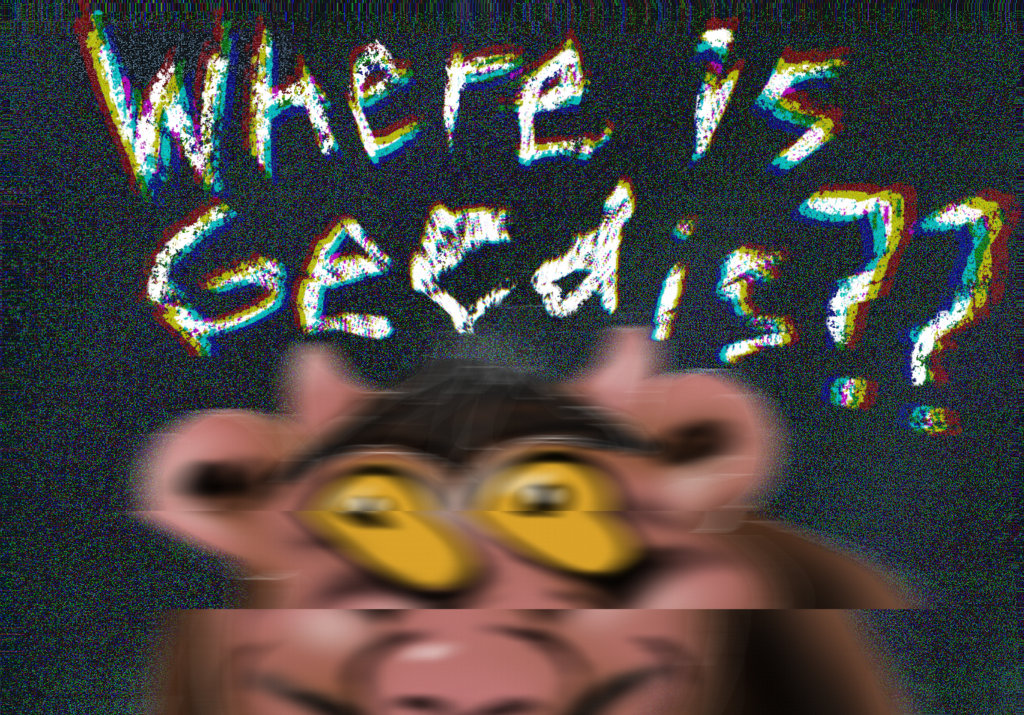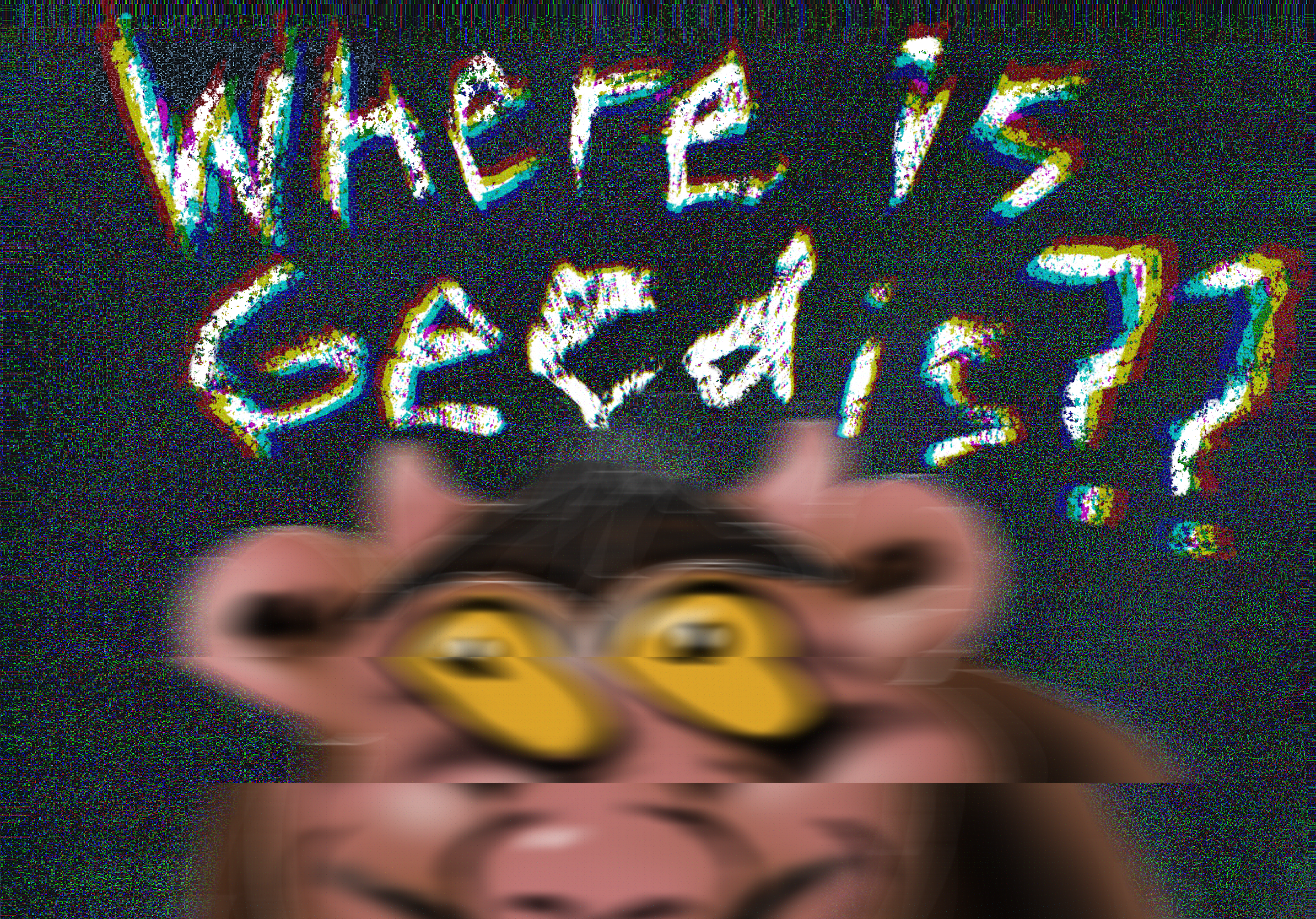The day I killed Geedis, I felt the greatest sense of relief I have ever experienced, or perhaps ever will. I should have known it wouldn’t last.
I had just finished sending out the weekly URTV email chain one Sunday afternoon when there was a ping in the inbox. It was from a student by the name of Lou D’Amaro, inquiring as to whether URTV was in possession of a VHS player. He’d found a bunch of old tapes at his grandma’s house and was curious what was on them. I told him we didn’t have a VHS player, but that he could rent one from the Art and Music Library, and if he needed an older TV to hook it up to, URTV had a couple to offer. He agreed, and I told him I would leave the TV room unlocked one Saturday so he could let himself in.
Sunday morning I found the door to the room ajar. I crept in, grumbling about inconsiderate freshmen and the decline of modern society, when I saw that the TV was still on, and the VCR hadn’t been returned. It was at the end of a tape.
Curious, I rewound. I waited for the tape to reach the beginning, then hit play.
Music. The image of a grassy hill appeared onscreen, rippling indistinctly in a three-frame animation loop. Some kind of old cartoon, then.
A young boy in medieval clothing pranced into view, followed by a small party of animals. A narrator described the scene: “Here comes our protagonist, Alakar! Alakar is friends with all the animals: the birds, the squirrels, and even the mimsy-foos.”
Alakar danced with the animals on the screen, and one by one, they skittered away. He skipped into the woods.
“But his very best friend of all,” said the narrator, “is the one you all know well.”
Alakar skipped to a stop in a clearing among the trees. Something rustled.
“Quiet!” said the narrator. “Here he comes now!”
A bird burst from the edges of the clearing and flew into the sky.
“Wait,” said the narrator. “That’s not right. Where’s Geedis?”
I shivered. A title card flashed onto the screen in giant white bubble letters: “WHERE’S GEEDIS?”
And I really should have shut off the TV there and then. I should have. I really should have.
It was then that the boy turned and looked directly at me. “Where, oh, where is Geedis?” said Alakar. “Do you know what happened to Geedis? Can you help me find him?”
I shut my eyes.
The last thing I heard before I opened them again was the voice of the narrator: “Yes, Alakar. I think the viewer can help you.”
I awoke to the sensation of a light breeze blowing across my face.
When I opened my eyes, there was a small figure standing over me. “Wakey-wakey!” it said, and reached out a hand to help me to my feet. “I’m Alakar. And you?”
“Caden,” I murmured groggily.
“I’m looking for my friend Geedis,” said Alakar. “Can you help me?”
“NO!” I shouted, scrambling backward. “You don’t know what Geedis has done to me! I won’t be a thrall to Geedis again!”
“Thrall?” said Alakar. “Geedis is kind. Geedis would never hurt anyone. Unless, of course,” he considered, “you were bad.”
This didn’t sound like the Geedis I knew, who had haunted my sleep and subjected me to pain the likes of which I will never forget. “Well, it doesn’t matter anymore,” I said. “Geedis is dead.”
Alakar laughed. “You silly! Geedis cannot be killed. He is old. Older than the Sun and the Moon. And yet he is amiable, and a friend to everyone. You silly!”
“Well,” I asked cautiously, “if you could guess one place in the world where Geedis might be, what would you say?”
“Well,” said Alakar slowly, “the coronation is tomorrow, and everyone will want to be there to see the new king. Maybe we can find Geedis there.”
“Coronation?” I said. “Do you mean to say that the lost scepter of Ta has been found?”
“Why, yes, silly!” said Alakar. “You must live deep in the mud of the Tambi Plains not to have heard! There is a new king, and all of Ta is waiting to see him!”
Geedis, wherever he was, was up to his old tricks, then. When I had last visited the Land of Ta, it was Geedis who had led me to the scepter. I had taken it, hoping it would free me from Geedis’s iron grip, but it had turned me into a monster. It was then that I had thrust the scepter into the hollow cavity that was Geedis’s heart, and watched him suffer and die before me — or so I had thought. I wondered who the new king was. What poor fool had fallen for Geedis’s scheme?
Whatever the case, if it was true that Geedis had returned, the only thing left to do was to find him and kill him. If my past experiences were any indication, only then could I escape the Land of Ta.
“Take me to the coronation,” I said.
The next morning, we arrived at the coronation in diverging moods. Alakar’s high spirits amidst all the bustling people and markets of the castle town of Ta were matched only by my growing sense of dread at the possibility of coming face to face with Geedis again. And soon came the procession.
The king was hidden from view, shrouded within a curtained palanquin carried by a team of servants. A golden figure — neither human nor automaton, but somewhere in between — led them through the crowd and to the castle steps. I sensed that I had much to learn about the Land of Ta and its traditions. Not that I planned on sticking around to hear it.
When they reached the top of the steps, the golden man lurched forward. The crowd hushed into silence. “And now,” the golden man proclaimed, “the King of Ta!”
The servants parted the curtains. A four-legged figure stepped out.
The creature had a wasplike head and wings, the same twisted features I had borne when I had touched the scepter. But other things were different. The shape of its body didn’t seem human at all — it was lumpy and squat, with huge eyes and four feet that looked like hands. And indeed, one of its feet was raised, clutching the as-until-recently-lost scepter of Ta like a walking aid. The more I looked at it, the more familiar it appeared.
Horror dawning upon me, I listened as the cheers and applause died down and the King of Ta began his first speech. And beneath the insectoid buzz, I could just recognize the king’s voice.
Geedis.
The world came back into focus. The crowd was staring at me. Alakar gave me a nudge. “What?” I asked.
“You’ve been selected!” he said. “The king has selected you to be the first to meet with him as a representative of the common people!”
In a daze, I followed the press of the crowd to the steps, where the abominable wasp-Geedis came to meet me. “Hello,” he said, the slightest hint of a threat in his voice. “Come.”
And so I followed him into the palace.
We stood in a long marble chamber decorated with flags of red and green. I looked around. There was nothing I could use as a weapon.
“Tokar,” said Geedis, “dismiss the servants.”
The golden man obeyed. Soon Geedis and I were alone.
He turned to face me. “Do you know why I have brought you here?” said Geedis, his voice like a swarm of locusts.
“Well, last time it was about the scepter, and it seems like you’ve found the scepter, so I imagine you’re here to tell me I can go free and never be bothered by you again. Right?”
Geedis laughed a soulless laugh. “The scepter has served me well, but I am almost fully healed. I am above such mortal trifles as thrones. Soon I will be discarding it. Still, the scepter must be claimed.”
“Your scepter only inflicts suffering!” I retorted.
“Yes,” Geedis conceded. “I should like to see you suffer, as well.”
And with that, the hideous wasp-Geedis began to molt. His skin split down the middle, his features distorting like wax. For a second I could see his familiar penetrating eyes behind the insectoid face as it fell from his body, and then the whole skin crumpled to the floor. And Geedis emerged.
He cast the scepter at my feet. “Take up the scepter!”
There was still the semblance of a wound where the scepter had stabbed Geedis, the last time we had met. But I knew the consequences of picking it up again. I kicked it across the marble floor and ran.
Geedis bounded after me. I was fast, but he was faster. It was only a matter of who would make it to the door first.
I made it to the door, but it was locked. Looking behind me, I saw Geedis rapidly approaching. I dove to the side.
Geedis skidded into the palace door with such force that it burst open, showering the steps with splinters. What remained of the onlookers from the procession gasped in shock. I crept into view for a better look.
Geedis sprang to his feet and scampered into the crowd like a frightened animal. There was a gracelessness about him I had never seen before. Meanwhile, Alakar made his way into the open, exclaiming “There you are, Geedis!”
“The boy killed the king!”
Geedis’s voice rose above his audience like a beacon, and I realized he was pointing at me. “Boy?” I said. “I’m literally in college!”
But the crowd was already a mob, and they were headed toward me. As they tore me limb from limb I wished only for a swift death, a wish that was granted when I looked up and saw a peasant lifting a hammer above my skull—
I came to on the floor of the TV room, my head and limbs still aching. Turning my gaze to the TV, I saw the tape was still running. Onscreen, Alakar stood on the castle steps. They had already been scrubbed clean of my blood. And Geedis stood beside him, two best friends reunited. They were both looking directly at me.
“Well done!” said Alakar. “You found Geedis!”
“Thank you!” Geedis chirped.
“And remember,” said the narrator, “Geedis loves you. And Geedis never forgets.”
The sun set in the Land of Ta, and the theme music played as the credits rolled. But when I looked closer, there were no names of voice actors or animators listed in the credits. There was just one phrase, repeated again and again: “GEEDIS NEVER FORGETS.”
I unplugged the TV.
And with that, friends, we come to the conclusion of my review of The Land of Ta Season 1, Episode 18: “Where’s Geedis?” (1981). All in all, a terrible experience. Do not watch. You’re better off throwing the tape into the Genesee or giving it to someone you really hate. I cannot stress this enough. ★☆☆☆☆. Geedis never forgets.



